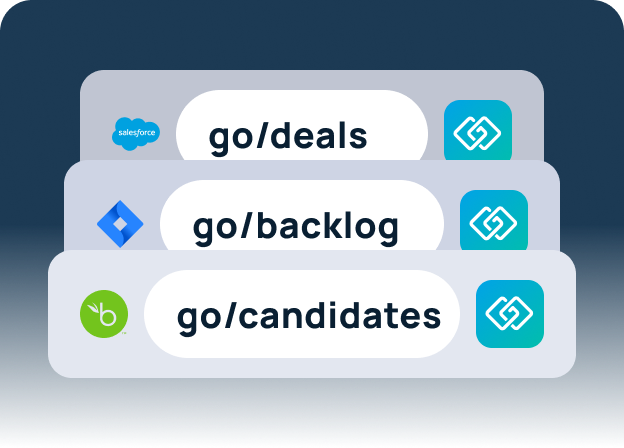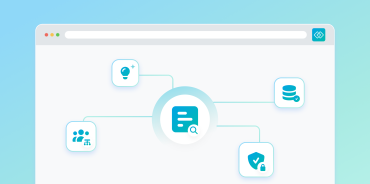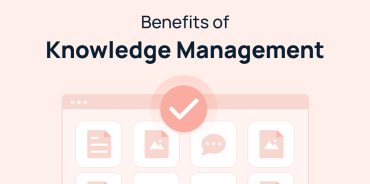The increase in AI tools and features has changed the knowledge management game.
Traditionally, enterprise knowledge management systems have required meticulous organization and constant updates.
Now we have AI that not only organizes data for us, but learns from it, anticipates needs, and adapts on the fly. We don’t need to waste time searching through endless folders or scrolling through long documents. With AI, knowledge comes to us — instantly!
Think about it: AI-powered tools can now analyze mountains of data faster than you can say “Google it.” They’re not just organizing information; they’re actually learning from it. Whether it’s spotting trends, making predictions, or just helping you find that report from last year.
Want to know how you can use AI for better knowledge management?
We talked to tech leaders who are using AI and creating AI tools to improve knowledge management. Here are some of their insights on the upcoming year.
How AI will transform enterprise knowledge management in 2026
1. There will be a rise in human knowledge curators
Greg Sabo, Engineering Lead for AI Experiences at Asana, believes AI is becoming “a force multiplier for organizational knowledge” this year. But how will AI properly handle all the information we’re feeding it? Human knowledge curators.
Since we’re now having AI find, rephrase, and personalize content for each reader’s specific needs, we will need humans who know how to feed AI information in the right way.
Greg shares, “There will be a new need to capture and organize knowledge in ways that are useful to AI agents so that they can automatically complete simple tasks in support of human work.” Human knowledge curators will “be the ones who create and tune documentation for bots and AI-powered retrieval systems.”

“In the year ahead, we’ll see the rise of human knowledge curators who create and tune documentation for bots and AI-powered retrieval systems.”
— Greg Sabo, Engineering Lead for AI Experiences at Asana
2. Enterprises will now have their own internal ‘Google’
Jorge Zamora, founder of GoLinks, believes that with the rise of AI, any company will now have the ability to create their own internal “Google” experience.
To help companies achieve this, Jorge recently launched GoSearch: an AI-powered enterprise search software tool. GoSearch is designed to surface any company resource and answer any work question with a simple search query.
After talking with GoLinks customers, Jorge discerned their need for a Google-like experience – the ability to locate information swiftly with a single search.
Thanks to AI search tools, employees can effortlessly access the relevant knowledge and information vital for their day-to-day tasks. These AI tools connect to all your workplace apps and existing knowledge management tools to centralize information.

“With AI, we’re combining both of the key things that you need to be successful: your own personal documents, and your company’s knowledge – in a single search box.”
— Jorge Zamora, CEO and Founder of GoLinks
3. AI-powered chatbots will be a game-changer
Jon Morgan, CEO of Venture Smarter, has been using AI for knowledge management within his consulting company — and one of his favorite tools is AI chatbots.
One study by Boston Consulting Group found that internal AI chatbots significantly enhanced workplace productivity. Employees who engaged with the chatbot completed tasks 12.2% more, 25.1% faster, and 40% better than non-users.
“AI-powered chatbots are like having a knowledgeable colleague available 24/7,” Jon shares. “They can answer questions, provide guidance, and even offer training on-demand, all without needing a coffee break.”

“AI-powered chatbots are like having a knowledgeable colleague 24/7.”
— Jon Morgan, CEO of Venture Smarter
4. RAG and embeddings will be key AI features to look for
When asked what AI functionalities he saw impacting knowledge management, Greg Sabo, Engineering Lead for AI Experiences at Asana, said to look out for RAG and embeddings.
RAG (Retrieval-Augmented Generation) integrates retrieval-based and generative models in natural language processing. It enables the model to access and incorporate external knowledge sources during text generation, resulting in more contextually relevant outputs.
In other words, Greg explains that it “gives AI access to accurate, up-to-date information when generating answers to questions. This will allow chatbot interfaces to access a broad library of content so that users can trust that information is accurate.”
Embeddings refer to the representation of words, phrases, or sentences in a continuous vector space. In generative AI, embeddings are like secret codes that represent words or sentences in a way that computers can understand. These codes help AI models understand the meaning and context of words.
Greg shares that “Historically, people would often spend time thoroughly documenting an article that doesn’t get read simply because it was titled with something like “campaign” rather than “marketing.”’ With embeddings, gen AI can read between the lines, so to speak, to surface what the reader is really looking for.

“Embeddings will continue to be highly relevant, often combined with RAG systems, to help users find articles based on what they mean rather than what they say.”
— Greg Sabo, Engineering Lead for AI Experiences at Asana
5. Knowledge base updates will happen in real-time
Alari Aho, CEO and Founder at Toggle Inc, is constantly exploring how emerging technologies like AI can redefine their approach to productivity and knowledge management. Here’s how he sees AI transforming the 2026 landscape:
“In 2026, AI will enable real-time updates to knowledge bases, ensuring that information stays current with the latest industry trends, technologies, and best practices. By continuously scanning a multitude of sources and learning from user interactions, AI can identify knowledge gaps and fill them without human intervention.”
He adds, “This ongoing, automated curation process means that SaaS companies can maintain a cutting-edge knowledge base that evolves in lockstep with the industry, providing teams with instant access to the latest insights.”

“In 2026, AI will enable real-time updates to knowledge bases, ensuring that information stays current with the latest industry trends, technologies, and best practices.”
— Alari Aho, CEO and Founder, Toggle Inc
6. AI data will improve decision-making
Valentin Radu, CEO and Founder at Omniconvert believes AI is set to radically change data-based decision-making.
“Through AI, analyzing huge piles of customer data quickly will help companies get to know what their customers want more accurately, predicting future needs better. This will allow SaaS businesses to fine-tune their offerings to match what each customer is looking for, leading to better customer experiences and stronger loyalty.
The use of AI to predict and analyze will also make it easier for teams to access and use knowledge efficiently, promoting both innovation and smoother workflows. Coming from a background where the value of each customer over time is key, I believe AI will be crucial in getting a deeper insight into customer habits, ensuring our strategies remain ahead of the curve.”

“In 2026, AI is set to radically change how SaaS companies manage knowledge by putting a stronger emphasis on making decisions based on data.”
—Valentin Radu, CEO and Founder at Omniconvert
7. AI will personalize knowledge recommendations
Cache Merrill, Founder at Zibtek, shares how he thinks AI will revolutionize knowledge management in 2026 by transforming how we store, access, and utilize knowledge. Here are some of the key changes he thinks we can expect:
“AI-Driven Personalization: AI will tailor knowledge delivery based on individual roles and past interactions, streamlining access to relevant information and boosting productivity.
Automated Content Curation: Through identifying content gaps and usage patterns, AI will automate the updating of knowledge bases, ensuring that information remains current and comprehensive.
Enhanced Collaborative Learning: AI will foster a collaborative learning environment by recommending projects based on collective knowledge interactions, promoting continuous improvement.
Predictive Analytics for Knowledge Gaps: By analyzing data trends, AI will anticipate knowledge gaps, allowing companies to proactively address potential issues.”
For those looking to leverage AI more effectively, exploring different AI Prompt options can be a great starting point. These prompts can guide AI tools to produce more relevant and useful content for your needs.

“AI will tailor knowledge delivery based on individual roles and past interactions, streamlining access to relevant information and boosting productivity.”
—Cache Merrill, Founder at Zibtek
Top generative AI knowledge management software for 2026
If you’re looking for a new knowledge management platform that leverages AI, here’s a list to check out.
Knowledge Base
- Confluence: Uses AI for content generation
- Document360: Organizes documentation with generative AI
Task Management
- Jira: Offers an AI-driven virtual teammate chatbot
- Asana: Provides real-time work data pulled by AI
- Notion: Uses AI to extract key insights from database pages
Link Management
- GoLinks: Uses AI to surface relevant go links to work resources
Enterprise Search
- GoSearch: Uses AI to summarize & recommend knowledge
FAQ
How do AI-powered knowledge management systems handle data privacy?
Many generative AI tools prioritize data privacy and security by implementing measures to safeguard sensitive information. These measures include encryption, access controls, and regular security audits to ensure compliance with industry standards.
Can the AI algorithms adapt to evolving organizational needs over time?
Yes, AI algorithms in knowledge management tools are often designed to adapt to organizational needs. Through continuous learning and feedback mechanisms, these algorithms can refine their understanding of user behavior, content relevance, and search patterns.
Plus, many AI-powered systems offer real-time data updates to ensure you always have access to up-to-date and relevant information that’s pulled from your data sources. So, even when your tech stack grows, AI stays on top of the new information.
Are there any potential downsides associated with relying heavily on AI for knowledge management?
While AI offers numerous benefits, there are potential downsides and challenges. One concern is the risk of over-reliance on technology, which can lead to dependency issues if the AI system experiences downtime or malfunctions.
AI algorithms are also not always perfect and may introduce biases or errors in data processing, which could impact the accuracy of knowledge management outcomes. To mitigate these challenges, organizations should strike a balance between leveraging AI’s capabilities and preserving human oversight.
Getting started with AI-powered knowledge management
Maximize your team’s efficiency with three seamlessly integrated knowledge management tools tailored for collaborative success.
The GoLinks productivity suite brings together three AI-powered enterprise solutions:
🔗Go links for instant resource access
🔎Enterprise search for efficient information retrieval
👥People platform for fostering stronger peer connections
Already part of the GoLinks family but curious about our latest offerings? Schedule a demo to explore our new products in depth.
New to GoLinks? Dive in with our free trial, or reach out to our team for personalized assistance to kickstart your journey.
Access and share resources instantly with GoLinks
Try for free














